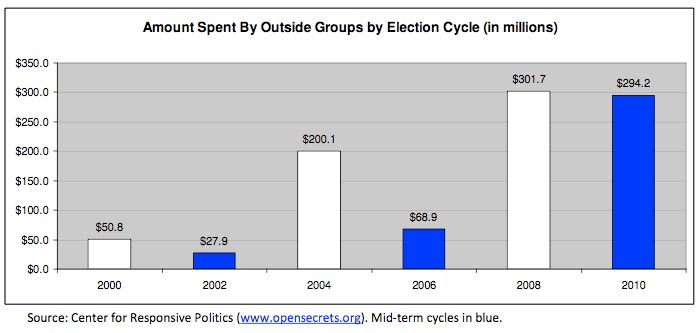The Supreme Court decision Citizens United vs. Federal Election Commission, decided in a 5-4 decision on January 21, 2010, is a case which will live in infamy. What started out as asking permission to put a partisan movie on pay per view somehow ended up deciding that companies are people with the same free speech rights as citizens, that money equals speech, and that any limit on money spent by a corporation was a violation of their First Amendment rights, so companies should be allowed to spend unlimited amounts without even having to identify themselves. Corporations got the rights of personhood, ergo, without the responsibilities we have like spending limits, or the requirement to be publicly listed for your donation. This is not to get into the obvious inequity that corporations are really made up of other people who already have those same rights, or that corporations will have far more resources to spend with obvious financial incentives that people won’t. Seriously–what were they thinking?
Such a brazen act of judicial activism by the Roberts court was an even more partisan power grab than the decade old Bush v. Gore, which backed a partisan Secretary of State’s order that ballots in her state stop being counted so she could hurry up and award the election to the guy whose campaign she was working on. Where that decision improperly decided the outcome of one election, Citizens United has opened the floodgates for blizzards of overwhelming corporate spending in races across the country on all levels of government, from now on, unless something is done.
The year since the Citizens United decision saw campaign spending explode. In this graph produced by Public Citizen from data collected by the , campaign spending in the midterm went up 427%.

And now the Supreme Court is set to examine whether Arizona’s long-running public election financing laws are fair to millionaires who might be dissuaded from trying to outspend opponents who get public resources.
It is no wonder many Americans are taking to election reform with a greater personal urgency than ever before. We have come to recognize that even when the public casts their votes, and our leaders pass popular laws, a few partisan cronies on the Supreme Court have proven eager to undermine the law they swore to uphold and protect.
This anniversary of Citizens United, instead of ceding control to anonymous corporate credit lines, people across the country are taking a public stand to show that they’re not letting this go. If anything, the vocal resistance to the Citizens United decision has only grown over the past year as more people recognized the reckless misinformation fueling campaigns in 2010.
I sat down with Heather Meyer, the Los Angeles chair of the Coffee Party USA, whose national members were marking the Citizens United anniversary with over 150 events across the country, from demonstrations, to meetings with elected representatives, to educational events, to strategy meetings to affecting local policy. , the local efforts at affecting election reform prove to be the most positive, and set the trend for national officeholders to be less resistant.
It has been after high points of abuses that past landmark overhauls to campaign laws have been introduced, because the public straight up demanded it.
A year after judicial activism undermined our election laws built up by generations, the next generation of reform is already taking root.
1 Comment
Subscribe to the RSS feed for comments on this post.
Leave a comment